
Government forces Ukrzaliznytsia to return to billion-dollar diesel purchases through intermediaries
A direct agreement with the manufacturer for cheap Lithuanian diesel Orlena may be the last. But the government believes that everything is not as bad as it seems. And officials really have arguments.
On April 5, the branch “Production Support Center” of JSC “Ukrzaliznytsia” entered into a direct agreement for the supply of 29.7 thousand tons of diesel fuel with the foreign manufacturer PJSC “Orlen Lietuva”. Deliveries worth $29 million (UAH 1.13 billion at the exchange rate) should take place in April-June.
This is reported in the Prozorro system .
The procurement report states that the estimated purchase price under FCA Motskawa terms is $910 per ton excluding VAT and excise tax. The Platts index for the first ten days of April was used to form the price.
According to Our Money calculations, the price of Orlen diesel under this Ukrzaliznytsia contract could be 52,869 UAH per ton or 44 hryvnia per liter, taking into account all taxes and delivery. This is a low price: according to the Enkorr publication, wholesale diesel prices in Ukraine are now above 46 UAH/l.
However, this purchase of diesel by Ukrzaliznytsia directly from the manufacturer may be the last. The case is in Resolution No. 382 of April 2, by which the government made a number of changes to another government decree No. 1178 , regulating procurement procedures during the invasion. Most of these changes are aimed at truly improving procurement, but one novelty turned out to be scandalous for Ukrzaliznytsia itself.
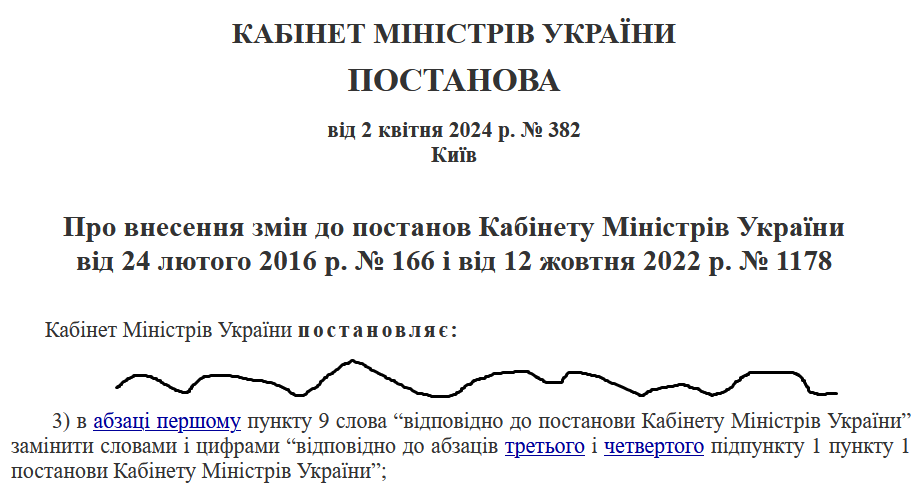
1178 contains paragraph 9 on public procurement of goods, works and services to meet the urgent needs of the functioning of the state under martial law. According to the preliminary edition, it stated that these purchases are carried out by customers without the use of procurement procedures/simplified procurement in accordance with another Cabinet Resolution No. 185 dated March 2, 2022. The reference to the entire Resolution 185 meant that Ukrzaliznytsia, in accordance with the second paragraph of paragraph 1 of subparagraph 1 of this resolution, is authorized to act as a customer for the purchase of fuel for the “uninterrupted functioning of railway transport and reducing the shortage of petroleum products on the domestic market of Ukraine.”
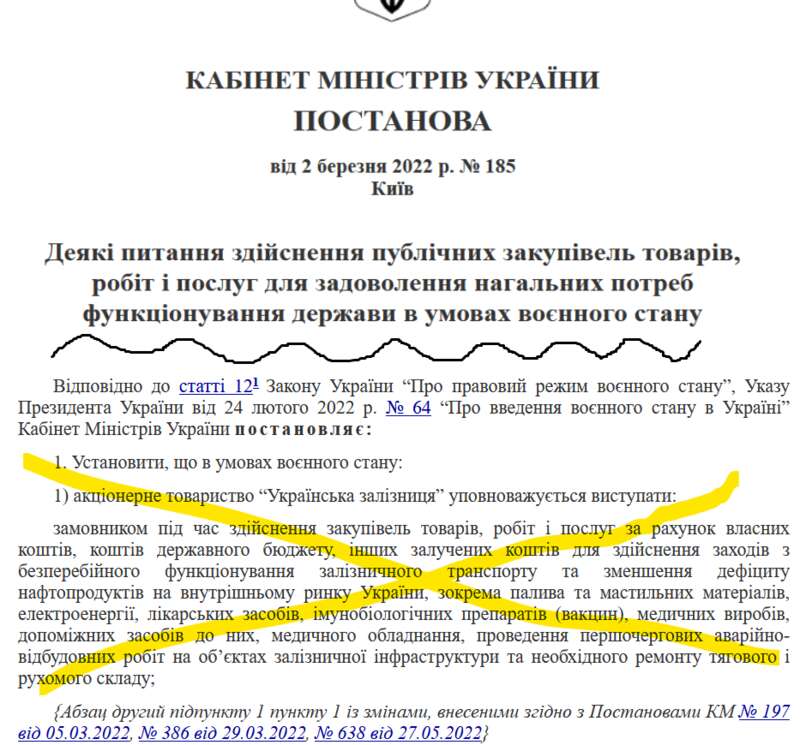
But the latest changes made a reference from 1178 not to the entire resolution 185, but only to paragraphs of the third and fourth subparagraph 1 of paragraph 1.
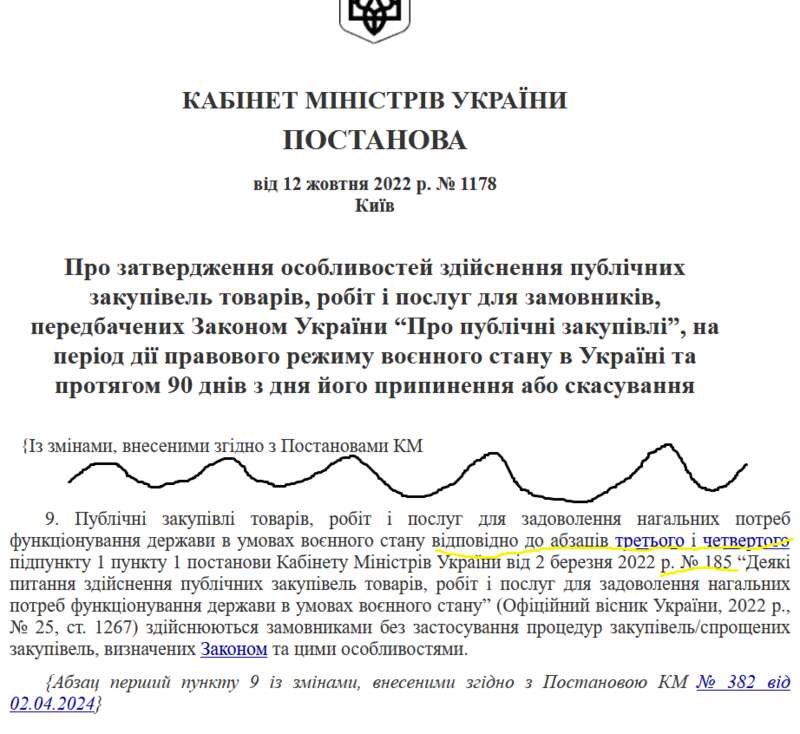
These paragraphs regulate the purchase of goods, which at the very beginning of the invasion it was decided to carry out for regional administrations and other authorities through Ukrzaliznytsia. That is, the talk was about Ukrzaliznytsia paying for contracts of other authorities and supplying humanitarian goods and food to war-torn regions. This scheme lasted only a few months. And already in the summer of 2022, after the liberation of the north of Ukraine, it actually ceased to exist, since normal supplies of goods were established.
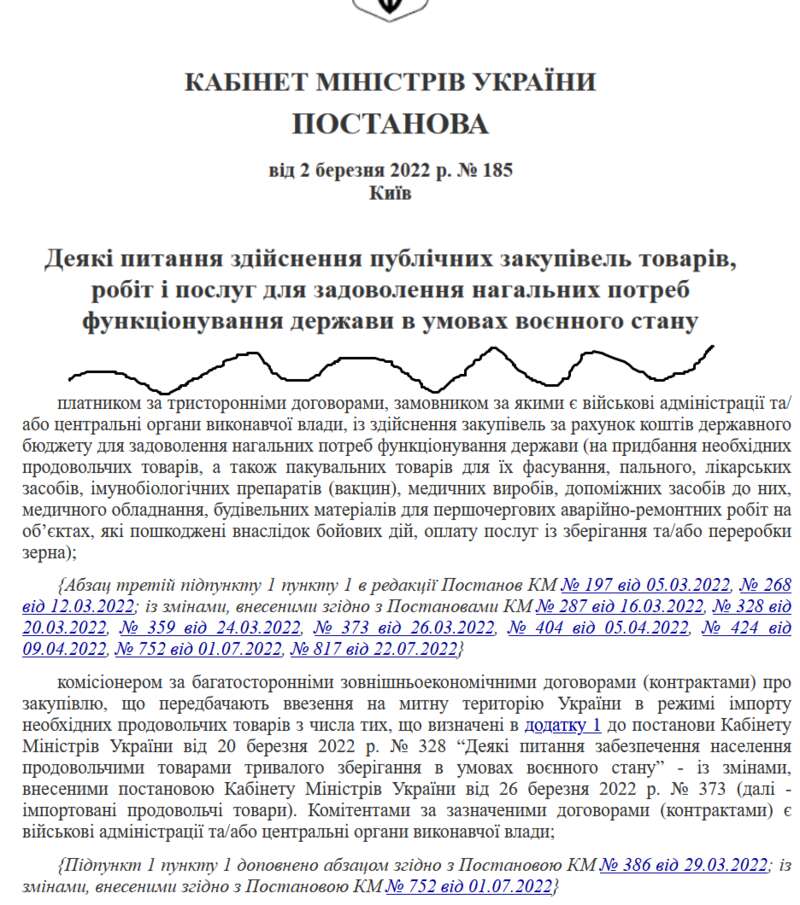
Contra "Ukrzaliznytsia"
Our Money’s sources in Ukrzaliznytsia believe that the government’s innovation is aimed at ensuring that Ukrzaliznytsia can no longer buy cheap fuel from manufacturers and returns to the scheme in force before the invasion. Back then, railway workers bought billions of dollars worth of diesel every year from resellers. They included their percentage in the supply price, thereby increasing the purchase price of diesel. However, these extra payments were avoided during the invasion thanks to the government’s decision to allow direct contracts with foreign producers (Ukrainian diesel production was virtually destroyed by Russian missiles).
In 2023, Ukrzaliznytsia spent UAH 9 billion on the purchase of diesel fuel. Accordingly, if intermediaries include a 10% commission in subsequent purchases, the state-owned company will be forced to spend about UAH 1 billion solely on increasing trader income.
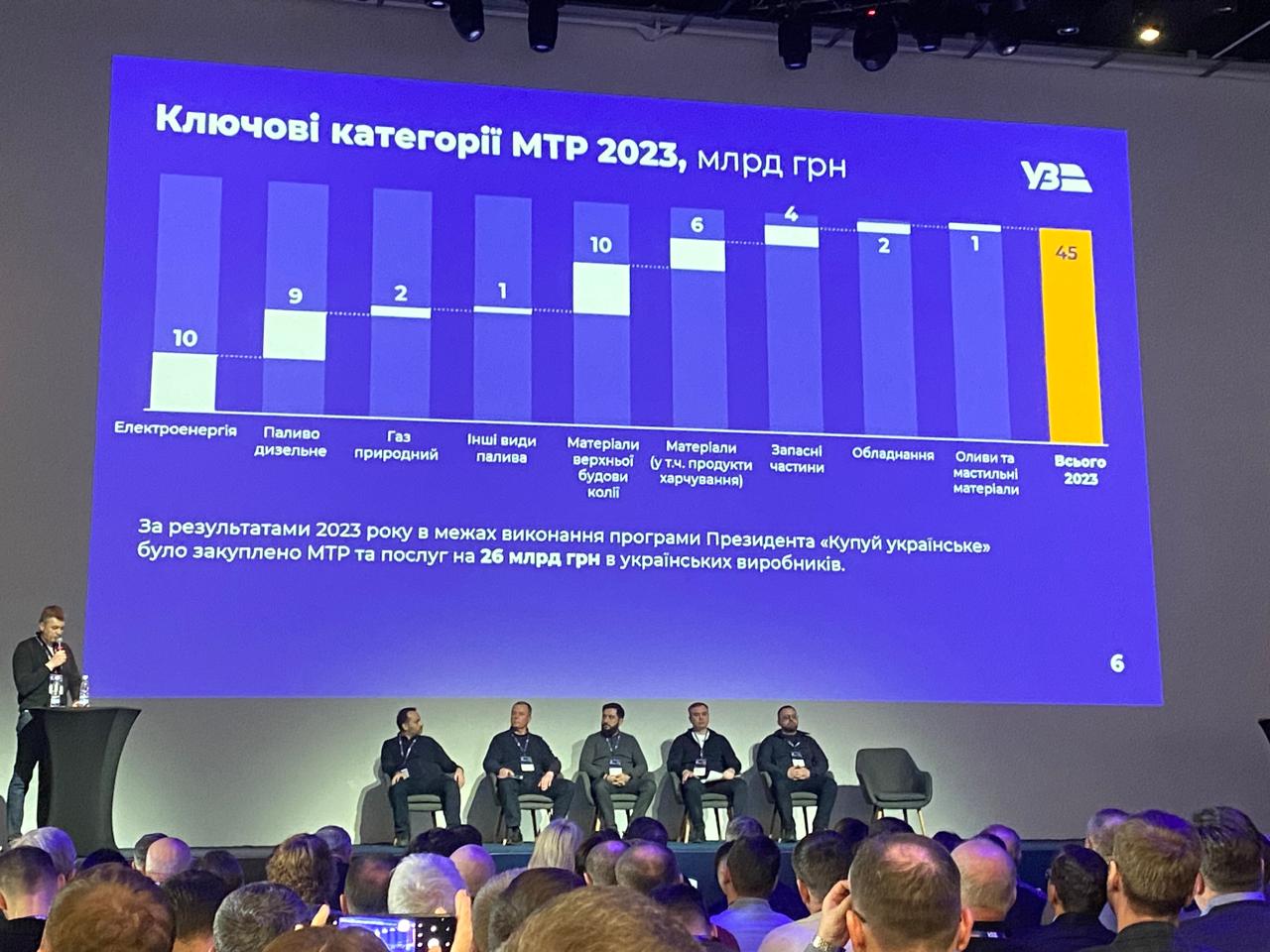
Pro government
A source from Our Money in the government explained this story as follows.
During the invasion, Ukrzaliznytsia was given the opportunity to purchase through direct transactions not only diesel fuel, but also any other goods that it may at its discretion call necessary to “ensure the safety of transport and its uninterrupted operation.” This has led to railroad workers reporting direct contracts one and a half times higher than the system average. That is, there is much more room for maneuver than with just a diesel engine. And this carries the risk that when a relatively good management is replaced by the worst guys, there will be a gigantic space for manipulation. Since Prozorro has extremely scanty data on direct agreements (from NG: this is true, and more on that below).
Also noteworthy is the fact that no other civil customer in Ukraine has similar permissions at the government level to independently conclude direct agreements, as determined by Resolution 185 for Ukrzaliznytsia. This gives rise to unhealthy opinions among other large Ukrainian customers that they should also be allowed to directly buy some goods from non-residents. Among which it will not always be possible to accurately distinguish a manufacturer somewhere in China.
And the opportunity for direct transactions remains. If Ukrzaliznytsia lowers the expected price to the manufacturer’s level, not a single trader will be able to offer it, and then there will be no offers at open auction. Therefore, after the cancellation of the auction, you can go into a direct agreement.
Both sides have compelling arguments
The government quite logically talks about the risks of gray areas in the hands of dark forces. These exceptions for the railway were adopted at the beginning of 2022 at the height of the invasion, when Kubrakov’s team showed real effectiveness against the background of other structures. For example, few people know, but then Reznikov’s Ministry of Defence completely failed the issues of weapons logistics in Ukraine. And this was locked up at UZ, because it showed its effectiveness and direct agreements helped it.
But discretionary zones are dangerous because different people can make different decisions even within the same structure. For example, on diesel fuel, UZ made good decisions on agreements with manufacturers at low prices. And then other people made bad decisions regarding transformers, and UZ bought them twice as expensive because of the same loophole from Resolution 185 (we are talking about the same scandal with the detained SSU officer Artem Shylo).
However, games with open bidding can also end badly. The scandals of 2019 and 2021 are still vivid in memory, when railway workers actually tried to buy fuel cheaper. But they received stiff resistance from the market - from the same firms and small firms that are now deprived of the opportunity to earn a “hoof margin” on the supply of UZ diesel. Businessmen disrupted auctions and disrupted deliveries, thereby blackmailing Ukrzaliznytsia to obtain better conditions for themselves. Then it got to the point that warehouses along the railway were “drying up”, and trains were on the verge of stopping.
And this is not about the fact that Ukrnafta currently does not have the ability to supply diesel to the railways. It has, and UZ enters into direct agreements with it in the same way as with Orlen or ExxonMobil. But see above about the “good” and “bad” guys...
Our Money has its own idea of how to satisfy everyone. It is as follows.
Alter "Our money"
Ukrzaliznytsia and the Ministry of Defence should be recognized as customers who have the right to purchase only diesel fuel through direct transactions. The criterion for why they are given this right is the following: they are the largest buyers of diesel in the country. Last year, Ukrzaliznytsia bought 9 billion, the Ministry of Defence almost twice as much. Their orders are so large that if their supplier (whoever he was) for some reason suddenly disrupted the supply, and UZ and MO would have to abruptly go outside the market for fuel, they would collapse it, that is, from -due to a sharp increase in demand, prices would shoot up. To put it very roughly, Ukrzaliznytsia, under a contract with Orlen, receives as much diesel in a month as the whole of Ukraine consumes in one day (we are talking about all, all, all consumption - state, business, private cars).
All other diesel customers in Ukraine are much smaller, so no exceptions are needed. Neither the police nor Energoatom buys as much fuel as Ukrzaliznytsia and Moscow Region. Therefore, the security of diesel supplies specifically for these two structures, and even during war, has much greater weight than the issue of equality.
At the same time, even now UZ diesel purchases are very non-transparent, and this is a real problem.
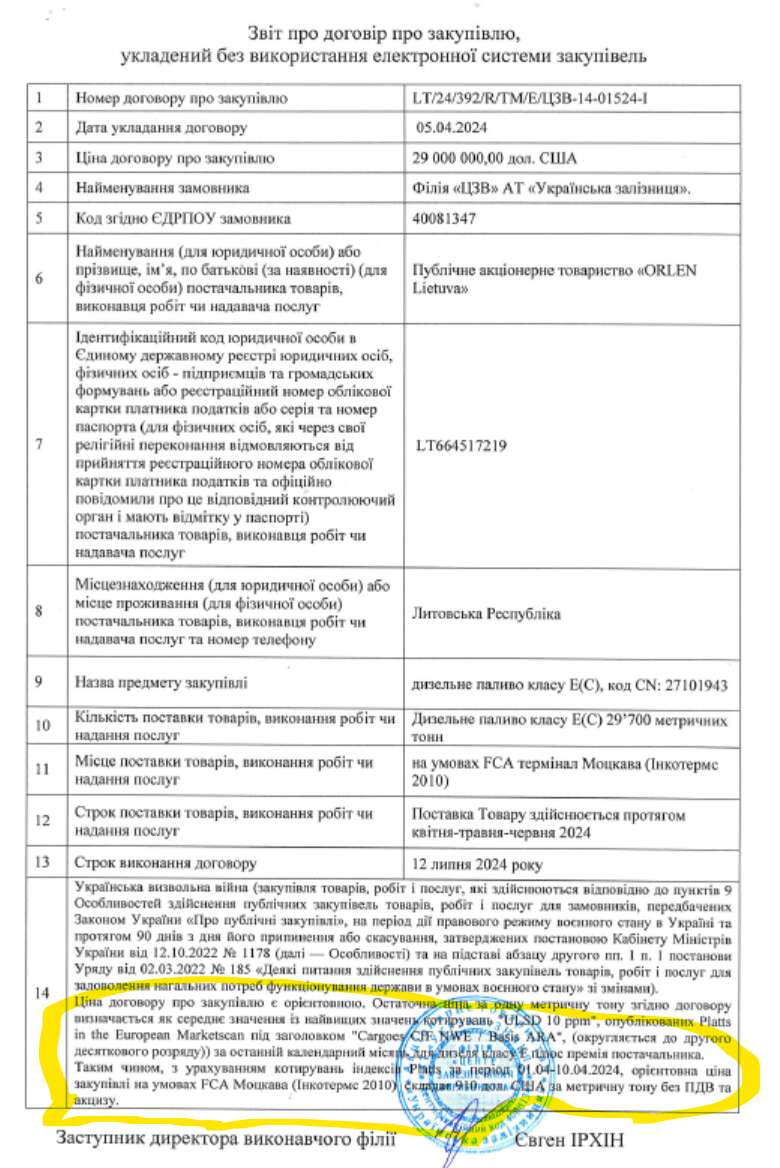
We reported above that the price of diesel under the contract with Orlen is 44 UAH/liter. But these are our calculations based on market data and information from sources. Formally, UZ only wrote this in the contract report: the price on FCA terms in Lithuania. That is, in addition to the well-known excise tax of 6,856 UAH/t and VAT of 20% before receiving the price in Ukraine, you also need to know the price of logistics and the supplier’s premium. But there is no data in the UZ report. Because it involves trade secrets. Often protected secrets are much stronger than military ones ( example ).
But the lack of verified price data creates opportunities for the bad guys to replace the good guys. Or for the “good” ones who decide to become bad. Few people know, but a year ago the Ukrzaliznytsia reports did not even contain data on “$910 per ton on FSA terms.” The unit price was not indicated at all, because this is not required by government regulations. The railway workers began to publish at least this meager information after many internal discussions precisely in order to show their good goals: not to light up one of the largest purchasing flows in Ukraine. However, any change in sentiment and data on the price of diesel will disappear from Ukrzaliznytsia’s reports. Because, as already mentioned, government regulations do not require this.
...We understand that the government has already changed the regulations. And it is unlikely that the changes will be rolled back. It is also clear what risks UZ will soon face, since the contract with Orlen is designed for only three months. This means that we are about to begin open bidding and prepare for a meeting with the evil old “legal entities.”
Therefore, with this publication we are trying to show that life in procurement is not black and white. We will continue to balance.
Author: Yuriy Nikolov